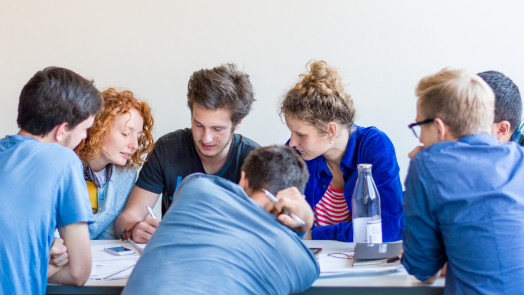Master in
Applied Linguistics
Do you want to learn how to describe a language or a dialect, directly from the voice of the native speakers? Do you want to know how to use language technologies to analyse large amounts of language data? Do you want to understand how to design interventions to promote and protect languages and cultures?
Course description
The programme will not be offered in the 2024/25 academic year.
In this master programme, you will learn that linguistics represents a set of knowledge that can be applied to a wide range of professional and research situations.
Studying languages first means learning how they work through the theories and methods of linguistics. However, knowing about linguistics is not enough to fully understand the role of a language in human communication. On the one hand, in fact, it is necessary to know how to "read" the social and cultural context in which languages are used, while on the other hand knowing the digital tools provided by modern language technologies is necessary as well.
At the end of your studies, you will be able to apply your knowledge to document, describe and analyse languages and dialects in very different social and cultural contexts. You will also be able to use and create language resources for professional and research purposes.
Courses will definetely be starting
At a glance
Degree class: LM-39
ECTS credits: 120
Duration of the course: 2 years
Courses will be taught in: Italian, German and English (trilingual)
Places available: 20 EU + 5 non-EU
Campus: Brixen-Bressanone
Tuition fees: ca. €1350 per year
Course structure
The study plan includes a first common part that allows you to combine three complementary disciplines: linguistics, computer science and statistics, and social-anthropological subjects.
The programme then divides into two paths that allow a greater specialisation. In the curriculum "Language policies and promotion of languages" you will learn more about the acquisition of language and the rights and protection of minorities, while in the curriculum "Automatic language analysis" you will be able to further develop your computational and technological skills.
Language diversity is not only the subject of study, but is an intrinsic part of the student and academic life at unibz. Our courses are held in three languages (Italian, English and German) to effectively stimulate communication between students and lecturers in an international multilingual and cultural environment.
The study plan includes workshops, field study experiences, case studies, guest lectures and seminars with the aim of refining the skills of analysis of linguistic and sociolinguistic phenomena.
The course organisation, divided into compulsory-attendance workshops and optional-attendance lectures, supplemented by Blockseminare and remote teaching, meets the differentiated needs of today's students.
Study course structure
People
Degree Course director: Prof. Silvia Dal Negro (photo)
Student Representative in the Course Council: to be defined
Exchange programmes and internships
During studies, it is possible to spend time abroad, taking advantage of the exchange network with partner universities, e.g., in Marburg or Mannheim to explore (among other things) topics in the areas of dialectology, psycholinguistics and multilingualism.
To complete the training, there is a mandatory internship, lasting at least 150 hours, in public or private companies. For example, several students did their internship at the Bruno Kessler Foundation, later transforming their internship project into a thesis project. Others have been accepted by EURAC for projects on multilingualism, language policies or corpus linguistics. Other internships have been activated at publishing houses, schools, specialized libraries, institutes for the protection and documentation of minority languages, and even at a hospital.
Career opportunities
The Master trains specialists in linguistics with job prospects in the fields of communication (audio-video, web, publishing), protection and promotion of languages and multilingualism (cultural institutions, public administrations), language technologies (software companies), language teaching (language schools) and scientific research (PhD).
Highlights
Studying at unibz
Living in South Tyrol, Housing, Scholarships, Single Subject Courses and more
Coming to unibz from Abroad
Everything you need to know as a degree-seeking applicant or as an incoming exchange student




